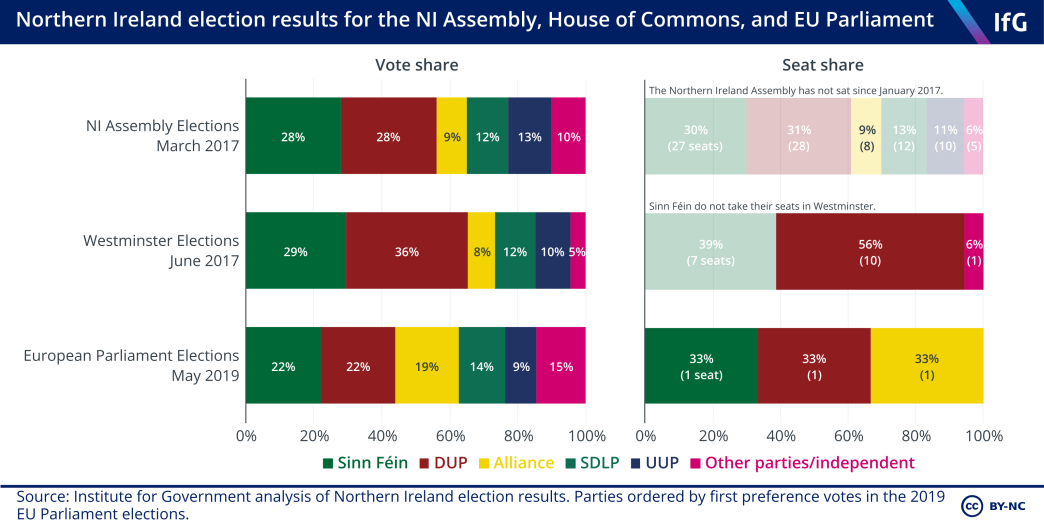Westminster needs to pay attention to the European election results – in Northern Ireland
Just because the Northern Irish European election results came late does not make them any less important for the future of Brexit.
Northern Ireland counted its European election results on Monday. But, Jill Rutter says, just because the Northern Irish results came late does not make them any less important for the future of Brexit.
Nigel Farage “nul points”. That was the first striking thing about the results from Northern Ireland: the Brexit Party only fought in Great Britain.
The second striking thing was that Northern Ireland will now be represented in the European Parliament by three women.
But the most striking thing is who they are. One is from the Democratic Unionists: Diane Dodds, married to the DUP’s leader in Westminster. One is the equally inevitable Sinn Féin representative, Martina Anderson. But the third MEP is Naomi Long from the cross-community Alliance Party – who were the big gainers, more than doubling their share of first preferences. The Ulster Unionists lost the seat they held, leaving them outside the European Parliament.
Turnout was higher – but lower
There are always problems with interpreting European Parliament election results: they are usually a minority interest. But Northern Ireland had the highest turnout in the UK – at 45% – but that was six percentage points lower than the 2014 turnout. Arlene Foster used that to justify the poor result for Leave – people didn’t see the need to vote again (not an argument with much currency in the rest of the UK).
It is far from clear that is the right takeaway. Just as voters in Great Britain could use those elections to send a message to Westminster about the sort of Brexit they want, voters in Northern Ireland could also use them as an opportunity to send a message – the danger is that message is drowned out in the noise around the Brexit Party’s success.
First preferences reinforced the EU referendum result
Northern Ireland uses a different electoral system for European elections. Voters get preferences and transfers matter. The vote shares first time round showed Sinn Féin topping the poll with 22.2% but the DUP coming second with 21.8% and Alliance third with 18.5%. The Belfast Telegraph pointed out that meant that 57% of first preferences went to parties who supported Remain and the backstop – replicating the 56% Remain vote in the referendum. Naomi Long emerged as the big gainer on the transfers as candidates were eliminated.
Westminster politicians need to take account of the whole picture from Northern Ireland. Brussels will
Former No.10 staffer Matthew O’Toole (yes, he’s from Northern Ireland) tweeted this morning that politicians in London would not be paying attention to the election results in Northern Ireland. He is probably right. The continuing lack of an Executive, combined with Conservative reliance on the DUP to sustain their minority government, means that London has a one-sided view of what Northern Ireland wants. The sole Northern Irish voice in the Commons in favour of the backstop and sceptical about “alternative arrangements” is the independent Lady Sylvia Hermon.

Of course, the first best solution is the reinstatement of the power-sharing Executive, but absent that, politicians here must be willing to engage with the full range of opinion in Northern Ireland.
Even if UK politicians are not paying much attention, politicians in the Republic and in Brussels (Naomi Long will join Guy Verhofstadt’s ALDE group) will take the results as evidence that it is they, not the UK Government, which is better representing the majority “Remain/softer Brexit” view in Northern Ireland.
Gung ho no dealers need to think through what happens in Northern Ireland
Northern Ireland could end up as collateral damage in the Conservative leadership contest. If it turns into a contest to see who can out-Farage the Brexit Party, the inconvenience of the land border – which ended up dictating Theresa May’s fate – may be pushed aside. Back in March, even the DUP seemed to be reconsidering the extent to which their interests and those of the European Research Group coincided, arguing they would rather stay in the EU than risk the Union.
Arlene Foster’s epitaph on Theresa May was that she had fundamentally misjudged the DUP throughout the Brexit negotiations – and any new leader needed to understand what made the DUP tick. Jeremy Hunt is suggesting he may put the DUP on his revamped Brexit negotiating team, if elected.
That is not enough. A new prime minister, and the next administration, need to understand not just the DUP – but also the much more complicated view of Northern Ireland as a whole.
- Topic
- Devolution
- Keywords
- The union
- Country (international)
- European Union
- United Kingdom
- Northern Ireland
- Political party
- Democratic Unionist Party Sinn Féin
- Publisher
- Institute for Government